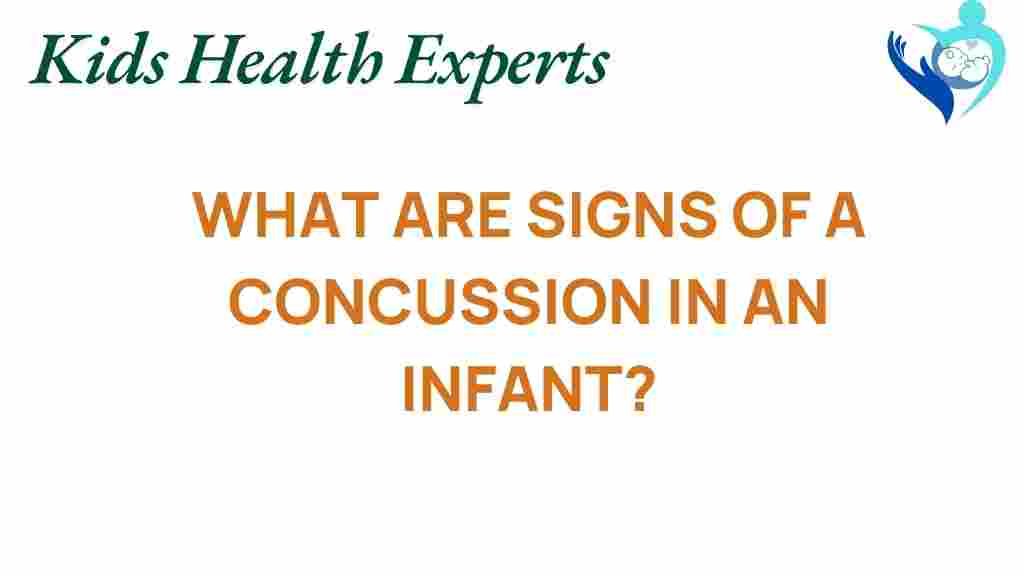Unraveling the Mystery: Signs of Concussion in Infants
Concussions are often thought of as injuries primarily affecting older children and adults, especially athletes. However, infants are also vulnerable to brain injuries from falls, bumps, and accidental impacts. Understanding the signs of a concussion in infants is crucial for ensuring their health and well-being. In this article, we will explore the symptoms of concussion, the importance of early detection, and how parental awareness can significantly impact pediatric care.
Understanding Concussion and Infant Health
A concussion is a type of traumatic brain injury (TBI) that occurs when the brain is jolted within the skull, often due to a blow to the head. In infants, this can happen during play, falls, or even minor accidents. Pediatric care for infants who may have suffered a concussion is vital, as their developing brains are particularly susceptible to injury.
Recognizing the symptoms of a concussion in infants can be challenging since they cannot verbally express what they feel. Hence, being aware of the signs and symptoms is essential for parents and caregivers.
Common Symptoms of Concussion in Infants
While the symptoms of concussion can vary, here are some common signs to watch for:
- Unusual Crying: If your infant is crying more than usual or has a high-pitched cry, it might indicate discomfort or distress.
- Increased Irritability: An irritable infant who cannot be soothed may be experiencing a concussion.
- Changes in Feeding: A sudden change in appetite, such as refusing to eat or drink, can be a symptom of brain injury.
- Difficulty Sleeping: If your infant is unusually sleepy or has trouble falling asleep, this could be a sign of a concussion.
- Loss of Balance: Watch for any difficulty in balancing or coordination while your infant is sitting or crawling.
- Vomiting: Repeated vomiting after a head injury is a serious symptom that requires immediate medical advice.
- Seizures: If your infant experiences seizures after a head injury, seek emergency medical care immediately.
Identifying these symptoms early can lead to prompt intervention and better outcomes for your infant’s health.
The Importance of Early Detection in Pediatric Care
Early detection of concussion symptoms in infants can make a significant difference in their recovery and overall health. Here are several reasons why early detection is crucial:
- Preventing Long-term Effects: Undiagnosed concussions can lead to ongoing neurological issues as the child grows.
- Timely Treatment: Early medical intervention can help mitigate the impact of the concussion and provide appropriate care.
- Improving Recovery Time: Infants who receive prompt treatment are likely to recover more quickly and effectively.
How to Monitor for Signs of Concussion
As a parent or caregiver, it is essential to be vigilant and monitor your infant for any concerning signs after a head injury. Here are steps you can take:
- Observe Behavior: Keep an eye on your infant’s behavior for changes in mood, crying, or feeding habits.
- Watch for Physical Symptoms: Look for signs like vomiting, unusual sleepiness, or difficulty with balance.
- Document Symptoms: Keeping a record of observed symptoms can be helpful for medical professionals during consultations.
- Consult with a Pediatrician: If you notice any concerning symptoms, it’s essential to seek medical advice as soon as possible.
Being proactive in monitoring your infant’s health can lead to better outcomes in case of a concussion.
When to Seek Medical Advice
It’s essential to know when to seek medical advice for your infant. Here are specific scenarios that warrant immediate attention:
- Any loss of consciousness, even briefly.
- Repeated vomiting or severe headache.
- Signs of confusion or disorientation.
- Seizures or unusual movements.
If your infant exhibits any of these symptoms after a head injury, do not hesitate to visit the nearest emergency room or contact your pediatrician.
Understanding the Role of Parental Awareness
Parental awareness plays a critical role in the health and safety of infants. Here are some tips for parents to enhance their awareness regarding concussions:
- Educate Yourself: Learn about the signs and symptoms of concussions and how they can affect infant health.
- Stay Informed: Keep updated with pediatric care recommendations and resources available for parents.
- Communicate with Caregivers: Ensure that all caregivers are aware of the signs of concussion and know how to respond.
By fostering a culture of safety and awareness, parents can help protect their infants from potential brain injuries.
Troubleshooting Tips for Parents
In case you suspect your infant may have a concussion, here are some troubleshooting tips:
- Stay Calm: Your infant can pick up on your emotions, so it’s important to remain calm and composed.
- Limit Stimulation: Reduce noise and bright lights to help soothe your infant if they appear distressed.
- Keep a Close Watch: Monitor your infant closely for any changes in symptoms or behavior.
- Follow Up: If you’ve consulted with a doctor, make sure to follow their advice and schedule any necessary follow-up appointments.
These steps can help you manage the situation effectively until professional medical assistance is obtained.
Conclusion
Concussions in infants may be a challenging topic for many parents, but understanding the signs and symptoms is essential for ensuring their health and safety. By being aware of the potential indicators of brain injury, seeking early detection, and maintaining open communication with healthcare providers, parents can provide the best possible pediatric care for their infants.
If you suspect your infant may have suffered a concussion, do not hesitate to seek medical advice. Remember, being proactive and informed can be the key to preventing long-term effects of brain injuries. For more information on pediatric care, consider visiting this resource.
For further reading on brain injury and infant health, you can check out this external link that provides additional insights and resources.
Stay vigilant and prioritize your infant’s health by being informed and prepared for any situation that might arise!
This article is in the category Conditions and created by KidsHealthExperts Team
